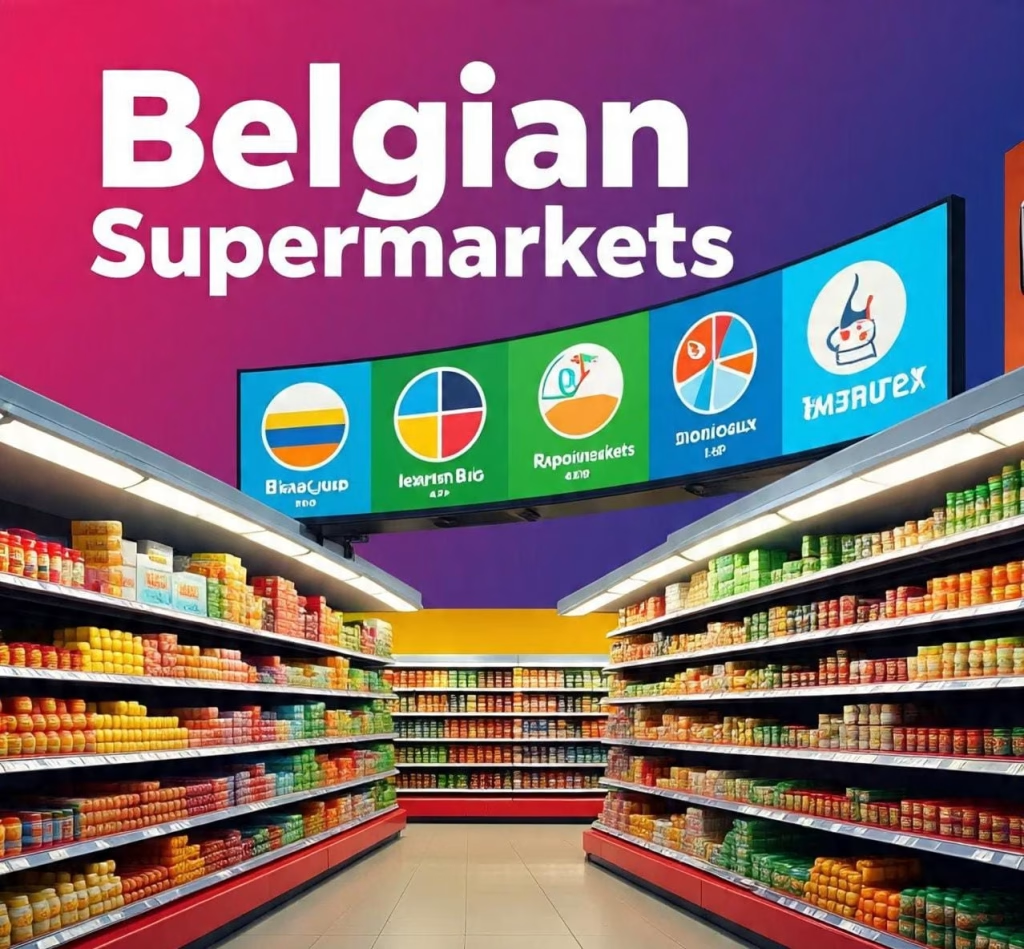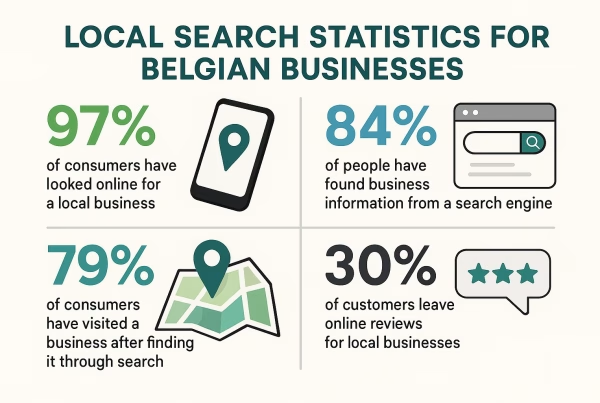Belgian supermarkets face unprecedented digital challenges. While Colruyt group commands 27%, Delhaize holds 22.5% and Carrefour maintains 22% of the market share, their online visibility tells a different story. In my 15 years consulting Belgian food retailers, I’ve watched traditional supermarket chains struggle with the complex multilingual SEO landscape that defines Belgium’s unique market.
The problem isn’t just competition from discount chains like Aldi and Lidl. It’s the fragmented digital presence across three language zones, inconsistent local search optimization, and the failure to capitalize on Belgium’s growing e-commerce sector, which stands at USD 22.71 billion in 2025 and is projected to grow at a 6.95% CAGR to USD 31.79 billion by 2030.
Belgian supermarkets that master multilingual SEO aren’t just surviving—they’re capturing market share from competitors who still think traditional marketing alone will suffice. Here’s how to dominate search results across Flanders, Wallonia, and Brussels.
Multilingual Foundations
Language Strategy Implementation
Belgium’s trilingual reality creates both opportunities and pitfalls for supermarket SEO. I learned this firsthand when consulting for a mid-sized chain expanding from Antwerp into Brussels. Their Dutch-optimized site was performing excellently in Flanders, but completely invisible to French-speaking customers just 50 kilometers south.
The mistake most Belgian supermarkets make? They treat multilingual SEO as translation rather than localization. Each language version needs distinct keyword research, cultural adaptation, and region-specific content strategies.
Essential multilingual SEO elements:
- Separate subdirectories for each language (example.be/nl/, example.be/fr/, example.be/de/)
- Hreflang tags properly implemented across all pages
- Language-specific keyword research reflecting regional shopping habits
- Culturally adapted content that resonates with each community
Regional Search Optimization

Flemish customers search differently than Walloon shoppers. In my experience working with Colruyt’s digital team, we discovered that Dutch queries often focus on price comparisons (“goedkope boodschappen”), while French searches emphasize quality and freshness (“produits frais de qualité”).
German-speaking customers in the eastern cantons present another challenge entirely—they often cross-reference Belgian prices with German retailers, requiring unique competitive positioning in your SEO strategy.
Local Search Mastery
Google Business Profile Optimization
Local search drives foot traffic, period. Recent data shows retail sales volume increased by 0.3% in July 2025, but supermarkets with optimized local presence captured disproportionate growth.
Your Google Business Profile becomes your digital storefront. I’ve seen Brussels locations increase walk-ins by 40% simply by optimizing their profiles with accurate multilingual descriptions, current opening hours, and regular photo updates showing fresh produce and promotional displays.
Critical local optimization factors:
- Complete business information in all relevant languages
- Regular posting schedule with promotional content
- Customer review management and multilingual responses
- Local inventory updates and seasonal product highlights
- Integration with online ordering systems
Neighborhood-Specific Content
Belgian supermarkets serve distinct neighborhoods with unique demographics. A Delhaize in Uccle serves different customers than one in Molenbeek. Your SEO strategy must reflect these differences.
Create location pages that address specific community needs. If you’re serving the European Quarter, emphasize international products and extended hours. For family-oriented suburbs like Woluwe-Saint-Pierre, focus on organic options and child-friendly shopping experiences.
Technical SEO Architecture
Site Speed Optimization
Mobile-first indexing hits Belgian supermarkets particularly hard because smartphones account for 58% of online purchases. Slow-loading recipe pages, product catalogs, and store locators kill both SEO performance and customer experience.
I recently audited a major Belgian chain whose mobile site took 8 seconds to load their weekly flyer. They were hemorrhaging traffic to competitors with faster, more responsive platforms.
GDPR-Compliant Tracking
European privacy regulations create unique SEO challenges. Your tracking setup must balance compliance with performance measurement. Many Belgian supermarkets I’ve worked with lost crucial SEO data by implementing overly restrictive privacy measures.
The solution involves first-party data collection, server-side tracking, and consent management platforms that don’t sacrifice analytical insights for compliance.
Content Strategy Excellence
Seasonal Content Planning
Belgian food culture revolves around seasonal traditions—from asparagus season in spring to Christmas market specialties. Your content calendar should align with these cultural moments while maintaining strong SEO fundamentals.
One client saw 300% traffic increases during white asparagus season by creating comprehensive guides to selection, preparation, and regional varieties. The key was publishing content 6-8 weeks before peak season, allowing time for search engines to index and rank the material.
Recipe and Cooking Integration
Belgians research recipes online before shopping. Creating SEO-optimized recipe content that links to your product pages creates a powerful conversion funnel. But here’s where most supermarkets fail—they create generic international recipes instead of focusing on authentic Belgian cuisine.
High-performing content categories:
- Traditional Belgian recipes with ingredient shopping lists
- Seasonal cooking guides featuring local products
- Nutritional content aligned with health trends
- Sustainable cooking practices and local sourcing stories
E-commerce SEO Strategy
Product Page Optimization
Online grocery shopping accelerated dramatically post-pandemic, and product page SEO determines visibility in this competitive space. Each product needs unique descriptions, structured data markup, and integration with inventory systems.
The common mistake? Duplicating manufacturer descriptions across multiple supermarket sites. Search engines penalize this approach, and customers can’t differentiate your offering from competitors.
Local Inventory Integration
Nothing frustrates customers like finding products online that aren’t available in their preferred store. Integrate inventory data with your SEO strategy to show real-time availability by location.
This approach also creates powerful local SEO opportunities. When someone searches for “organic milk Brussels,” your results can show which nearby stores have it in stock.
Competitive Intelligence Framework
Market Position Analysis
The top 10 supermarket ranking shows Colruyt leading, followed by Delhaize, Carrefour, Aldi, and Lidl, but digital rankings tell a different story. Many traditional leaders lag in search visibility, creating opportunities for aggressive SEO strategies.
I’ve helped smaller chains outrank major competitors by focusing on long-tail, location-specific keywords that the big players neglect. A independent supermarket in Ghent now outranks Carrefour for “organic vegetables Ghent” and similar local queries.
Emerging Competitor Monitoring
Discount chains and specialty stores increasingly challenge traditional supermarkets online. Aldi and Lidl’s aggressive digital expansion requires constant monitoring and strategic response.
Track competitor content strategies, keyword positioning, and local search performance. When Lidl launches a new promotional campaign, your SEO strategy should anticipate and counter their approach.
Advanced Implementation Tactics
Schema Markup Deployment
Structured data transforms how your supermarket appears in search results. Rich snippets showing prices, availability, and reviews increase click-through rates dramatically.
Implement schema markup for:
- Product information and pricing
- Store locations and hours
- Review aggregations
- Event markup for promotional periods
- Recipe structured data for cooking content
Voice Search Optimization
Belgian consumers increasingly use voice search for grocery-related queries. “Waar kan ik verse vis kopen?” or “Quelle boulangerie est ouverte dimanche?” represent growing search volumes.
Optimize for conversational queries and question-based content. Create FAQ sections addressing common voice search patterns in each language.
Performance Measurement Standards
Success in Belgian supermarket SEO requires sophisticated measurement beyond basic traffic metrics. Track multilingual performance separately, monitor local search visibility, and measure the complete customer journey from search to purchase.
Key performance indicators should include:
- Language-specific organic traffic growth
- Local pack appearances across different cities
- Mobile conversion rates by device and location
- Seasonal content performance and revenue attribution
- Voice search visibility and engagement metrics
The Belgian supermarket industry stands at a digital crossroads. Retailers are responding by reducing waste, sourcing locally, and minimizing their carbon footprint, but sustainability efforts must align with digital visibility strategies.
Supermarkets that implement comprehensive multilingual SEO strategies while maintaining strong local relevance will capture the growing online grocery market. Those that ignore these fundamentals will watch market share erode to more digitally sophisticated competitors.
Your SEO investment today determines your competitive position tomorrow. In Belgium’s complex multilingual market, there’s no room for generic approaches or half-measures.







